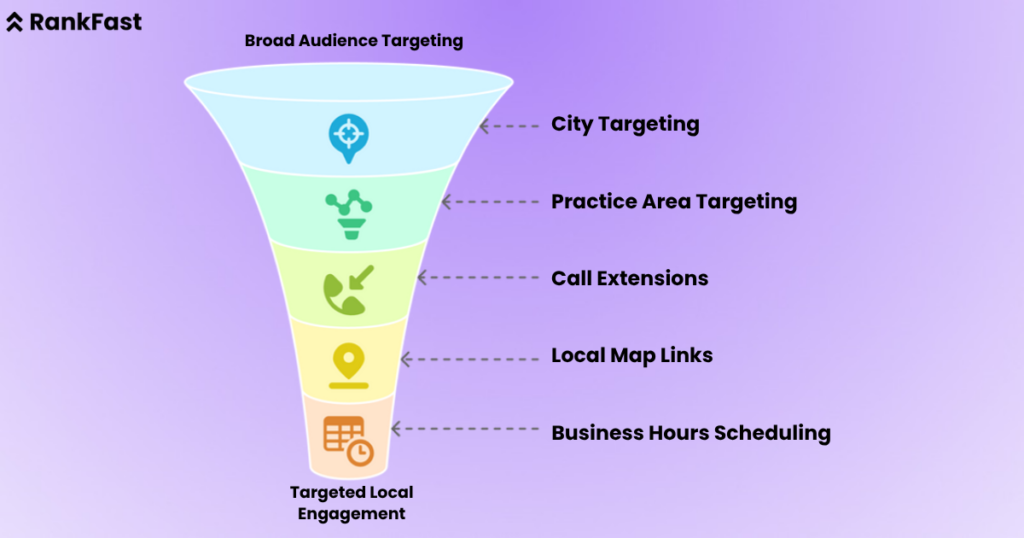Why do small law firms struggle to show up online while big firms dominate every search result? It’s not just budget, it’s usually missed opportunities. Over 33% of clients now begin their lawyer search online, not through referrals.
If your digital presence is weak, they never reach you. In this blog, we’ll explain how smaller law practices can compete with large law firms using a smart law firm SEO strategy without massive spending.
Why Competing Online Matters for Small and Mid-Sized Law Firms
A strong digital presence is no longer a bonus. It’s basic survival.
When someone types “divorce lawyer near me” or “property lawyer in Delhi”, they look at the top three results. These are often big law firms with high budgets, long histories, and large websites. But people don’t always want big. They want relevant, local, trustworthy.
This is your chance. If your site answers their question fast and builds trust in seconds, you win that click, even against bigger names.
Clients today don’t compare law firms the way they did before. They Google first, check reviews, skim your service pages, and then decide. This means your law firm SEO strategy must cover visibility, clarity, and credibility.
Smaller firms can’t outspend big players. But they can outrank them in local search, niche queries, and user intent. This makes SEO for small law practices a high-return effort. You don’t need hundreds of pages, just the right ones, at the right time.
By building local relevance, a client-focused website, and niche content, you don’t just compete, you stand out. If your competitors look corporate and impersonal, your clarity and speed become your biggest strengths.
Challenges Small Law Firms Face Against Big Firms Online
Small firms often lose online attention because they focus too much on offline referrals. Here’s where problems begin:
1. Low visibility on local search:
Without local SEO, your firm won’t show up in “near me” searches. That’s where clients look first.
2. Generic content that blends in:
Big firms may have legal blogs with hundreds of articles. But if yours lacks unique focus, it gets buried. Google wants depth, not repetition.
3. Weak or no reviews:
Social proof is non-negotiable. People trust peer reviews more than law firm ads. A small firm with no Google reviews looks invisible, even if it’s good.
4. Slow or outdated websites:
A site that takes more than 3 seconds to load loses users. If your website isn’t mobile-ready, you’ll lose 50% of traffic before it loads.
5. No tracking or analytics setup:
Many small practices don’t track calls, clicks, or leads. If you don’t measure, you can’t improve.
6. Poor use of local directories:
If your firm isn’t listed on Google Business Profile, JustDial, or LawRato with the same contact info, Google sees your presence as weak or unreliable.
Large firms use teams and tools. Small firms must use focus, consistency, and a law firm SEO strategy. The gap looks big, but with the right tactics, you don’t need to match their budget, only their visibility and relevance.
Proven Law Firm SEO Strategy to Compete with Big Firms Online
1. Build a Strong, Niche-Focused Brand
Stop trying to rank for everything. Focus. If your firm handles family law, your homepage and content should reflect only that. Google rewards relevance.
Instead of trying to compete with multi-practice firms, own a niche. Examples:
- “Child custody lawyer in Pune”
- “Startup legal services in Gurgaon”
Build authority in that segment. Use your case experience, local stories, and common questions to create page content that speaks directly to clients.
Even your logo, tagline, and design must reflect this tight focus. Clients trust clarity.
2. Optimize Your Website for Local SEO
Your site must be structured for local reach. This means:
- City-specific landing pages
- Clear headings (H1, H2) with keywords like “property dispute lawyer in Chennai”
- Mobile-first design
- Click-to-call buttons on every page
Don’t forget internal links between your service pages and your blog. Use schema markup (LocalBusiness) so Google understands what your firm does and where it is.
Your URL structure matters. Avoid long, complex links. Stick to:
- /family-law/
- /criminal-defense-mumbai/
Use tools like Screaming Frog to fix broken links or duplicate titles.
3. Leverage Google Business Profile and Local Listings
Your Google Business Profile must be claimed, verified, and fully optimised.
Checklist:
- Accurate firm name and address
- Office hours and call tracking number
- Legal categories (choose up to 3)
- At least 10 real photos
- Posts updated weekly (case wins, tips)
Also, add your listing to:
- JustDial
- IndiaMart (for legal services)
- Sulekha
- Bar Association websites
These increase trust and map signals. Keep your NAP (Name, Address, Phone) consistent across platforms.
4. Create High-Quality, Client-Focused Content
Forget long academic blogs. Focus on client intent.
Examples:
- “What happens if I don’t pay rent in Delhi?”
- “Difference between bailable and non-bailable offences”
- “How to file for divorce in Bangalore?”
Use a conversational tone but stay formal. Add FAQs, real client questions, and step-by-step answers. Include location in your content and meta description.
Update pages every 6–9 months. Fresh content ranks better.
5. Use Paid Ads Strategically (Even on a Budget)
Paid ads for a law firm help you target urgent needs. People searching “criminal lawyer near me now” need help fast.

Start with Google Search Ads:
- Target only your city and practice area
- Use call extensions and local map links
- Run during business hours only
Also, try retargeting ads to bring back site visitors who didn’t call or fill out your form.
Track ROI. Pause non-performing keywords fast. Focus spend on “near me” + urgent legal intent.
6. Collect and Showcase Positive Client Reviews
Reviews build trust faster than your portfolio. Google uses review count and frequency as ranking signals.
How to get reviews:
- Ask clients after case closure
- Share direct review links
- Use email follow-ups with CTA
Don’t ignore bad reviews. Respond calmly and professionally. Clients judge your tone. Pin your best reviews on Google Business and your homepage.
Add a reviews slider or testimonial widget to build trust directly on your service pages.
7. Be Active on Social Media to Build Trust and Visibility
Don’t try every platform. Focus on 1–2 based on your audience.
- LinkedIn: Post client wins (without names), explain legal processes
- Facebook: Share FAQs, legal tips, and short videos
- Instagram: Use carousel posts for myth vs fact, short Q&As
Use Canva or Lumen5 to turn blogs into visuals. Post 3–4 times a week. Use hashtags like #divorcelawyerIndia, #startupcompliance, and #NCLTcases to show up on searches.
Social proof builds local recall.
8. Offer a Personalized Client Experience Online
Make your site easy to use and human.
Include:
- WhatsApp chat button
- Free consultation form
- Clear “What to Expect” page
- Photos of real team members
- Simple language in your content
A smaller firm has a big edge here. Clients don’t want bureaucracy. They want empathy. Show that across your site and emails.
Tools and Technologies to Level the Playing Field
| Function | Tool Option (Free/Paid) | Benefit |
| Keyword Research | Ubersuggest, AnswerThePublic | Find client questions |
| Website Audit | Screaming Frog, Sitebulb | Fix SEO issues |
| Local Listings Tracker | BrightLocal | Check listings & citations |
| Call Tracking | CallRail | Know which campaigns work |
| Review Management | GatherUp | Automate review follow-ups |
These tools help smaller firms stay efficient and data-driven.
Tracking Your Progress and ROI
Use Google Analytics and Search Console to track:
- Calls from your website
- Organic clicks on key pages
- Most-read blogs
- Conversion from paid ads
Set up monthly reports. See what content ranks, what pages drop. Check bounce rate, dwell time, and top traffic sources. Only then refine.
SEO without tracking is just guessing. Make decisions based on real leads.
When to Outsource Your Law Firm Marketing
If you’ve fixed the basics but still rank low, or your calls are dropping, it’s time to outsource.
Choose an agency that:
- Knows legal marketing
- Tracks local keyword movement
- Builds authority through backlinks and content clusters
- Manages your reviews and local listings
Trying to do everything in-house usually leads to burnout and inconsistency. Work with experts who scale smart.
Final Thoughts
You can compete with large law firms, even with a small team. It starts with smart SEO, local focus, and client-first thinking. Your strength is speed, clarity, and connection. Don’t try to be big. Be better where it matters.
We help law firms grow online visibility at Rankfast. From SEO to reviews, we handle it all, so you can focus on your practice.
FAQs
1. Can a small law firm rank higher than a big one on Google?
Yes, with the right local SEO and content strategy, small firms can outrank big ones in specific cities or niches.
2. How much should a law firm spend on digital ads?
Start with a small budget targeting urgent keywords in your area. Track calls and adjust based on real leads.
3. What’s the best way to collect client reviews?
Ask right after a successful case closure. Share a direct Google review link via SMS or email.
4. Is blogging still useful for law firm SEO?
Yes. Answering real client questions through blogs helps improve ranking and builds trust.
5. How long does it take for SEO to show results?
Local SEO can show movement in 2–3 months. Full results usually take 6–9 months with consistent effort.

Leave a Reply